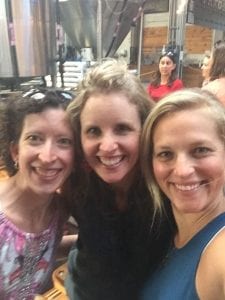I just spent 4 days with amazing teachers, presenters and friends at iFLT Cincinnati. It. Was. Wonderful. I felt inspired and invigorated to be with those who share my interests, passions and way of thinking. I spoke with a wide variety of individuals, from new teachers, to language lab teachers, to conference organizers, to authors, to veteran teachers and seasoned presenters. As I reflected on these conversations, a surprising theme stood out that was present (sometimes glaringly, sometimes subtly) throughout many of my conversations across all of the various groups. Any idea what it was?
Doubt. Doubt? Why would these people, many of whom I (and many others in our sphere) so greatly admire, experience feelings of doubt? It doesn’t make sense to me. They are amazing and how could they possibly feel doubt?
Types of doubt spanned three categories. 1. Self doubt: Am I good enough/beautiful enough/skinny enough? 2. Doubts about relationships and belongingness: Do they like me? Am I accepted? Do I fit in? Am I valued? 3. Doubts about their work: Is this good enough/useful enough/interesting enough/thoughtful enough? I found myself wondering, where does this doubt come from and what should we do about it?
A thought: It is human nature to compare and contrast. But, when we engage in this behavior, we tend to see things as “better” or “worse.” We categorize in hierarchical ways. I have “less” of this and she has “more” of that. This type of thinking is stressful, especially when one considers oneself to be on the lower end of the hierarchy.
A recommendation: Let us stop for a moment and acknowledge this behavior and acknowledge that it is most likely (although I’m not a behavioral scientist and don’t have specific data to back this up yet) completely normal. Now, let’s push, no…shove this behavior out of the way. Why? Because it’s stifling, it’s fearful, it’s egocentric, it’s damaging and it’s not productive. Phew! I feel better already.
How can we un-doubt-edly do better? After we admit and accept doubting behavior, let’s ask- is it productive? If not, then, catch yourself and try to reframe it and most importantly, move through it. In her TED talk, Sarah Lewis implores us to “embrace the near win.” She says, “We thrive not when we have done it all, but when we still have more to do.” Oscar Wilde states, “Be yourself. Everybody else is already taken.”
The world needs us to be who we really are and not a carbon copy of someone who already is. Your students need you to be who you authentically are and not a copy of another teacher (I’m not referring to modeling strategies after others or trying out recommended activities from others. That is certainly an important tool to finding your own style). I believe that once we step out or at least open the door when we find ourself dwelling in doubt, a tremendous amount of pressure will be lifted. Maybe your true potential will be unlocked. What would it feel like to live without fear? How would it impact your teaching if you shoved self doubt out of the way?
WE are un-doubt-edly awesome. YOU are un-doubt-edly awesome. I am un-doubt-edly awesome.
My goal: Recognize my own feelings of self-doubt and place them aside if they are not serving me. Embrace my near wins and keep on going.
-Wishing you happiness, healthiness and hugs!
P.S. Thank you trusted confidants (you know who you are) who, ironically enough, gave me feedback and insight, which propelled me through my own self-doubt and fear to a place where I feel comfortable enough to share this. ¡Gracias! Merci! Gratias


We all struggle to learn and accept that we have the freedom to simply decide, “I am enough!”
Thankfully, my Dad taught me that. 🙂
Well stated and thoughtful. I absolutely agree that “doubts “ about ones abilities, looks, and intelligence eat away at the core of an individual and limit their potential.
Thankfully, my Mom taught me to embrace my potential and not limit it. 🙂
Megan you are astute and insightful.
Thank you Teri! I learn from the best! 😉